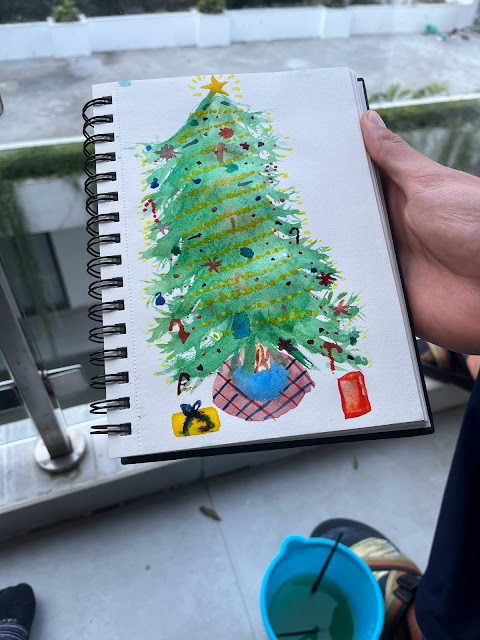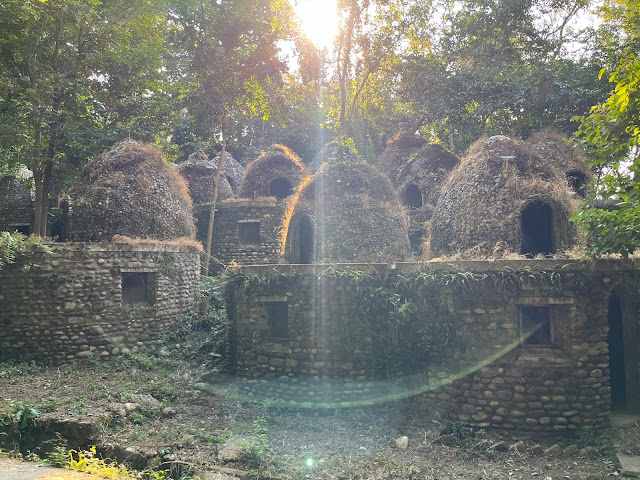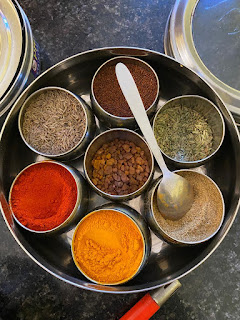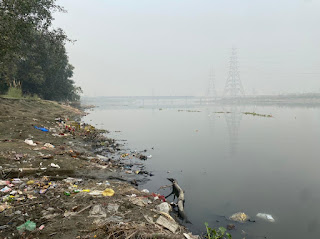Less than four weeks since my last post, we're getting better all the time! Per usual, so much has happened, and there's just so much to say, but what of it will be interesting to you, well I guess that'll change based on who you are, and where you are, and how you are.
Wherever you are, the holidays are here, if you celebrate them that is, and I'd just like to wish you all a happy holiday season. We're going to try to make this Christmas as Christmasy as possible but, that's not looking highly likely in Jaipur, but we're doing our best. We did paint a Christmas tree with water colors a week or so ago, and we've been able to watch a few of the classics like Elf, The Polar Express and Christmas Vacation so at least we've got that!
Phool Chatti
Shortly after we left Landour, we descended from the lovely elevation of the hills and headed to Phool Chatti ashram just outside of Rishikesh for a yoga and meditation retreat. Davis had done the same retreat at the same place 5 years prior during his first visit to India and wanted to have a similar experience again, so we went back.
On December 10th, we showed up to the new ashram, recently built and very beautiful. The week was spent with a relaxing but regimented and full schedule. The morning bell rang five times at 5:30am to wake us up for 6am meditation in the yoga hall. This usually resulted in me getting out of bed at about 5:40-5:45 and Davis getting out of bed at approximately 5:55am, with just enough time to throw on a few jackets and descend one flight of stairs, netti pot in hand, ready to meditate. Phool Chatti does its best to expose you to different type of meditation and immerse you in the ashram way of life. 6am meditation sometimes consisted of quiet meditations, and other times involved chanting and singing.
The type of meditation that I found was the most helpful in quieting down my monkey brain of sporadic, spontaneous thoughts, was that of using the mala beads. With the slow concentration, the physical presence of beads in my hand and an action to take with them, it helped me to keep my focus constant.
Afterwards, we went outside to blow every inkling of mucus out of our brains. You know, with a netti pot and a lot of hard exhales through our nostrils, sometimes getting our whole body involved to reeeaally drive it all out of there. Once our sinuses were clear as a bluebird day, we practiced some breathing techniques and some asanas (what westerners know as "yoga"), and then we had breakfast.
.jpeg) |
| The dining hall |
Meals were served on a beautiful terrace overlooking the Ganga river, the area was set with many small tables with a single chair, as meals were to be eaten alone, in silent contemplation. After breakfast, we practiced karma yoga for a short period of time, whether that be picking up trash from the river bed, or cleaning the dining room, or watering plants, each was done quietly and without expectation of reward or thanks. Following karma yoga, we would enjoy a group walk in nature, sometimes to a waterfall or a hill or the river, and once for ritual bathing in the Ganga.
 |
| After our dunk in the Ganga |
Lunch was served after our time in nature, and then we had a few hours in the afternoon to ourselves. This was Davis's nap time and our Hindi study time, plus sometimes we would play badminton and one day after seeing everyone posting at home about getting their Christmas trees, we decided to paint our Christmas tree!
Free time was 1:30-4pm and at 4pm we would gather as a group and talk about the day and how we were feeling. Then we'd practice more asana (yoga) and have some more chanting before going to the temple for singing and more chanting. At 7:30 we would eat dinner, and at 8:30 we'd have evening meditation and attempt to stay awake. It was so difficult, and many times I failed, and "deep meditation" as our teacher called it, would find me. At least I don't snore. At least I don't think I do.. As soon as evening meditation ended it was straight to the room, teeth brushed and we couldn't get our heads on our pillows fast enough as we were zonked out immediately.
I had a hard time at first. The chanting was a little much for me. The gods, although great and so happy for them and all the love and praise that they get, just weren't anyone I wanted to praise. I found myself struggling. Happy to partake in the asanas and meditations, but the rest felt like a lot. I expressed my concerns to Davis and he really helped me through this moment. He reminded me that the goal wasn't to convert me to the Hindu religion and way of life, but just to give me the chance to learn about it, to see what it was all about, and what a unique opportunity it was for me to be there and get to experience it. I also had this hope, that I realized I had put too much emphasis on and it had become an expectation, that I wanted to get something out of the retreat for me. I thought I needed long hours of quiet contemplation that would reveal some crazy enlightened idea to me and that I would be able to use that vastly enlightened thought in my own life. I thought I wasn't spending enough time in quiet meditation, I thought we chanted too much and I wasn't getting the quiet that I needed. I think I had this big grandiose picture in my mind. Davis pointed out to me that perhaps overcoming the adversity that I was feeling at the ashram was part of the lesson that my brain was trying to learn, and that in itself was an experience I could learn and grow from. In fact, he was spot on. One of the things that I appreciate about him the most is that he gives 100% of himself to everything that he does. Its incredibly admirable and gave me the little nudge I needed to be set in the right direction. So I spent karma yoga in quiet contemplation that day. Put my stubbornness aside and knew that he was right.
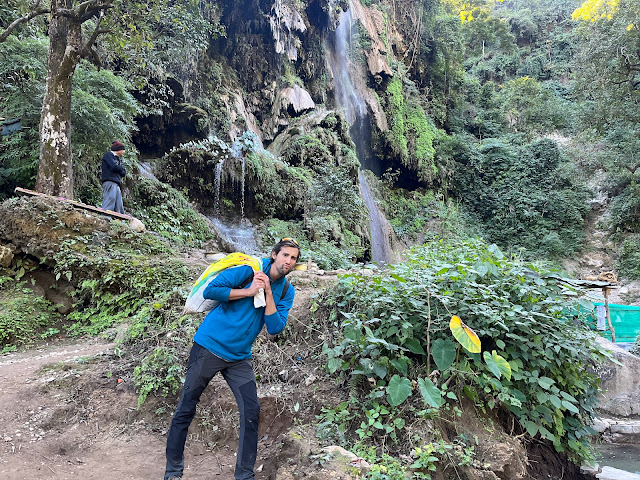 |
| The only person I've seen picking up garbage in India |
That is to say that from then on, I gave it my all. I chanted all the chants, I sang all the songs, I asanaed all the asanas. And I felt so much better about everything. The evening group singing we had bells, and there were lights that resembled Christmas lights, so I turned it into Christmas caroling in my head and we rang our bells and sang the songs about the mother Ganga and Shiva shambo with gusto.
I loved being so close to the Ganga (Ganges) river. You could hear it singing from anywhere in the ashram, you could see it from most places at the ashram as well. We spent time cleaning the trash from the river bed, we spent time meditating by the shore and we had a ceremony with flowers where we all got in the water, many of us fully submerged in her chilly depths. A couple times just sitting on rocks near the waters edge, toes submerged, basking in the glorious warmth of the sunshine, we'd journal, or meditate, or play harmonica.
I wrote this poem as well.
The week ended with a fire ceremony, it consisted of a lot of chanting and at the end we had written a piece of paper with one habit on it that we wanted to get rid of, and we threw this in the fire to symbolize the termination and death of that habit inside of us.
 |
| Fire ceremony |
By the end of the week, I surprised myself by feeling a tinge of sadness, I actually hoped that the course would continue for a few more days as I was finally getting the hang of life around the ashram. But alas, we had places to go, and on December 16th, we headed back to the land of honking horns, blaring music, and paved roads, but with a new sense of calm.
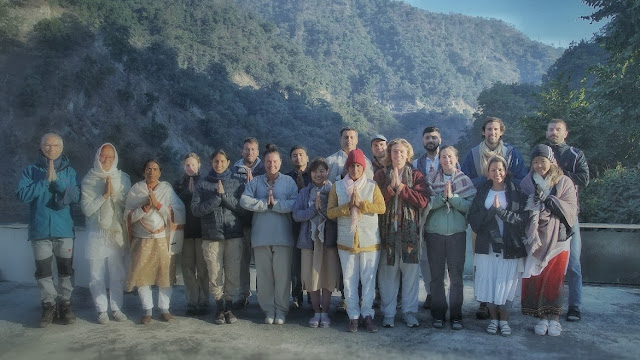 |
| The group photo at the end of the retreat |
Rishikesh
The next few days in Rishikesh were pretty jam packed with fun adventures. We went white water rafting on the Ganga, it was a fun but cold trip. It also wasn't very long, but in our short time on the raft, we still got to experience some pretty good rapids that definitely left us soaked (and chilled).
The same day as our short white water trip, we went to the famous Beatles ashram. We didn't know much about the ashram walking in besides the little that we had been told. The Beatles visited this ashram for a few months in 1968 in order to learn about meditation and write music. The ashram has since been abandoned and more recently has been turned into a tourist attraction. The jungle is making good time of reclaiming the land for itself, which only adds to the allure of the destination. There is a lot of cool graffiti on old dilapidated buildings, but I think the real appeal is the land in the process of "rewilding" this area. There are many cool, small, rounded meditation huts and presumably homes that have all been abandoned and have different mosses and vines growing all around them. The place has a mystical vibe, and if it weren't for the throngs of school kids running around, it might even be peaceful.
We took a Master Chef Masala cooking course from surprisingly, the same guy that Davis took a cooking course from on his trip to India 5 years ago. We just happened upon his spice shop and inquired about the cooking course he offered, and then Davis found a photo on his phone to prove that they had met previously! It was serendipitous and we had to take a class from him. It ended up being his wife that taught us but we did learn how to make magic mother sauce, the base of mannyyy great Indian dishes (the secret is in the sauce), from which we made three different dishes, one based on each a yellow, red and green curry. We made mixed veg (red), shahi paneer (yellow), and saag aloo (green), as well as a rice dish called veg pulao, chapati/ roti, and the infamous masala chai. In India, small cups of sweet, spicy, and milky chai are consumed many times a day.***DISCLAIMER: I tried to add recipes that were similar to the ones that we made, but I have not made these specific recipes myself, if you do make them, please let me know how they taste!*** The course was wonderful, we learned about spices and how and when to use them and more importantly, how to combine them.
Do you know the difference between spicy and hot? Spicy means spices! Essentially flavors like ginger and cinnamon and cloves and turmeric and pepper and flaaaaavor. Hot just means strong peppers that make your nose run, and in Davis's case, hiccup. Makes perfect sense.Neer waterfall and Secret waterfall just outside of Rishikesh also make for nice little visits. I walked up to the secret waterfall one morning, and just a ways below the falls was a small shallow pool, slowly gaining sunlight and quickly gaining my appreciation for its tranquility.
After a few days in Rishikesh, we were ready (or not) for 9-10 hours on the bike to a new state, Rajasthan, to see Jaipur! More on that next time. For now, let's talk idiosyncrasies. Or just some differences that you may or may not find as interesting as I do.
Idiosyncrasies and Cultural Musings
Not only is Hindi it's own language, but it has its own alphabet, which is very different than the one used here in this post, but they still love to have signs in english. Many times the signs are spelled incorrectly, extra or missing letters, no spaces between words, and sometimes signs that make no sense at all. Of course, as a lover of words, my eyes are drawn every time. I love these signs and sometimes I get a nice little chuckle out of it as well. Here are a couple for ya, but I'll add more later as we come across them.
Large trucks with exclamation points that appear to contain something dangerous will say, "Highly Inflammable Liquid!" Sooooo is it dangerous? Is it just simply water? It's hard to say.
A large oil tanker on the road, and written on the back it says "Only for Edible Oil". What kind of oil is in that truck I wonder and who could need cooking oil in such a high quantity?
We passed a hotel today called Hotel Grey Dot. That's it. I don't know what else to say, but it sure made me laugh.
We also passed a hospital called Pulse Hospital. Really? It feels so cringey but also hilarious. I'm not quite sure how I feel about it.
There are some very interesting dichotomies that I have come across while living here. It is very unfortunate that there is trash everywhere. It's hard to overlook and hard to walk past, but there's just no good infrastructure in place for trash collection and so many people burn their garbage in heaps in front of their homes and just throw any wrapper down along the road when they're done eating its contents. Anyway, you don't go anywhere without seeing soda bottles or chip bags or candy wrappers; garbage everywhere. Yet in Landour, we saw people sweeping the small amount of dirt and debris on the street, sweeping the leaves off the hills, scraping moss from brick walls, but nobody picking up garbage. It was very interesting to me to see what the priorities were, I guess the trash is just so ingrained into their society that they don't even notice its very stark presence on the landscape.
Something else we have found quite amusing and at times frustrating, is the level of bureaucracy with the level of organization. Most things are highly bureaucratic but lacking in any real organization. It's like they're trying to compensate for that lack. Case in point, when we went into the Beatles ashram we bought a ticket and I gave them my passport so they could write down the information that they needed in order for us to enter (already this seems over the top for entry to an abandoned ashram). During our time inside the ashram, Davis threw away the ticket, assuming that it was garbage at this point. When we were exiting the ashram, they asked for the ticket, and we obviously didn't have it anymore. This was a big deal, they wouldn't let us exit. We had to sit and wait for at least 5 minutes while they rifled through several different notebooks looking for my passport information. In the end they found it and let us go.
Ambulance culture. A lot of my musings come from the many hours spent on the back of the motorcycle. Anyway, how do ambulances get where they're going in crazy traffic with their lights on and siren blaring, you might wonder? Well they don't. They wait in traffic just like everyone else. Nobody moves over for them and no-one acts like they're any different than any other car on the street trying to sneak past them in line. This is so starkly contrasted with the courtesy given to ambulances back at home, where we all move over and part traffic like the red sea so they have a clear path forward.
Crosswalks, if they even exist, are more of a modern display of art to give the road a break from the drab black and gray to paint a few white lines that have never served more than an aesthetic purpose here. That is to say, pedestrians have no right of way, its every man for himself out there. You cross a street by running for your life, or sticking out a hand in a stop position and hoping the moped accelerating towards you swerves at the last second to avoid making you a puddle on the road. Traffic lights, if there are any, are only found in big cities and are more of suggestions than actual rules. What is a red light anyway? Plenty of people run them, when they think they've got the time, or don't have time, or just feel like rules are beneath them, or something.
Anyway, I hope you have a wonderful holiday season, whatever that might mean for you.
"Acknowledging the good that you already have in your life is the foundation for all abundance." -Eckhart Tolle

.jpeg)



